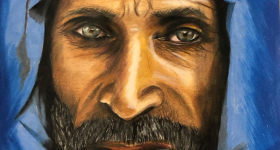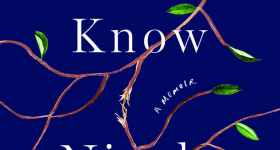My grandmother turned 100 last year. The celebration was, like most years, dinner at a Chinese restaurant on Christmas Day. The number of tables has grown as my cousins and I now bring partners and, for some, children. Four tables of four generations, spanning a century of living. We marveled at what she’d seen in her lifetime, from her childhood in rural China, where she awaited a marriage proposal by crafting paper flowers, through the Cultural Revolution and her arrival in Canada half a century ago. I’d lived only about a third of that span; it was hard to imagine doing it twice over.
The most excited person in attendance at the party, however, wasn’t one of my grandmother’s relatives. It was my partner, whose parents had granted him a rare reprieve from their Christmas dinner — a big ask from an Irish Catholic. At one point, before the beef and broccoli but after the mushroom and tofu dish, he leaned over to me and whispered, “Your grandmother has been glaring at me all night.” I glanced at her and saw a look not unrelated to the steely one she had once given someone who tried to steal her walker.
I’ve been bringing my partner to family events for a few years now, and still she will give us that look — one full of hurt, confusion and alarm. My parents introduced my partner to my grandmother as my friend — my roommate, actually. I love how my grandmother saw through this immediately while still nodding along. But I hate that this is how it is.
***
Of all her grandchildren, I’m the closest to my grandmother because she’d lived with us and helped raise my younger brother and me. I’m the eldest son of her eldest son, which meant I could get away with almost anything. She acquiesced to my demands for McDonald’s and, in her broken English, ordered fries for me and a fish sandwich for herself. It must have baffled her why I loved junk food so much, for she was a wonderful cook who made us golden and pillowy sponge cakes; chewy and refreshing water chestnut dumplings; steamed whole fish, seasoned with ginger, soy sauce and green onions. She, my mother and I would gather around our glass dining room table to make joong, bundles of glutinous rice wrapped in bamboo leaves with mung beans, peanuts, pork belly and a salty egg yolk.
After school, she and I played mahjong or cards to fill the hours until my parents came home from work. The clacking of mahjong tiles soothed me. She liked it because I practiced speaking Cantonese; at home, I usually spoke English. Our favorite card game was an invention of my mother’s, a twist on solitaire played by two people, and my grandmother took to the game fabulously. While she’d let me win mahjong sometimes, she was ruthless at cards. Her mind stayed sharp, even as her physical health declined.
After living with us, my grandmother lived on her own in a retirement community for two decades. She enjoyed mobility well into her late 90s, when she began relying on a walker outside of her apartment. We, her grandchildren, bought what looked like a sturdy and fairly attractive one — the equivalent of a middle-upper class family sedan, I think. She didn’t enjoy using it, but understood it was part of growing old. A few months later, some falls left her in a wheelchair.
She was heartbroken to move from her own apartment to assisted living. Now, she cannot cook, clean, dress or relieve herself. In recent visits, a recurring conversation for us is how difficult it is to want to do things and have your body betray you at every turn. There is not much to do at her nursing home. Aside from a small dining area, a common room, lit with harsh fluorescent bulbs, houses a single television in the corner playing the Chinese channel. Most residents end up napping in their chairs. One hundred years of history, to end up here.
***
I met my partner at the start of the decade and we have been on, then off, then mostly on again ever since. He is excitable and warm, with a booming laugh that hooked me instantly. “Your grandma and I would be best friends if I could speak Cantonese,” he told me once. “And if she could get over me being a man.”
“It’s a big hurdle, but not as big as you learning Cantonese,” I joked.
The last few times I have seen her, my grandmother has been especially focused on my not having a wife yet. But then, she’s always been one to talk about it. As a teenager, when I was still closeted, she’d ask if I had met any girls to date. I would lie and say I was looking, but that the search was difficult. I worried about disappointing her, and I didn’t yet have the vocabulary for the feelings I was having. How could I explain to her what had taken me nearly a decade to figure out for myself, when the same-sex attraction was buried so deep, the longing bundled in with so much self-loathing?
In my 20s, I told my grandmother I wasn’t looking, but that I was happy. I asked her to focus on how well other parts of my life were going: I had started a business I enjoyed, and my writing was getting published more often and in larger venues. I thought she’d be proud, but she would always return to my singlehood. She warned that I had to be careful, because she’d heard of men who’d put off finding wives until too late and then were doomed to be alone. This made me laugh, though I, too, had worried about ending up alone.
The world signals to queer people that we are not enough as we are. To express same-sex desire can still be very dangerous; the world still demands we render any non-normative part of ourselves invisible. This kept me in the closet for years and stayed with me even after I came out. I believed that I could not end up with anyone because I was not worthy of being seen. The few LGBT characters on television and in movies were positive signs but also never looked like me, and even if I could see myself in them, there were few models of older gay couples. Solitude, it seemed, was to be expected.
At some point, I realized it was necessary to embrace being alone and that it didn’t mean having to be lonely. In defining how I wanted to spend my time and to create my life, I ended up finding men who wanted to join me (at least partly) on the ride. I also came to see that loneliness is less choosy than I imagined — that many people are in marriages that can feel chillier than being alone, and many parents or grandparents still find themselves deserted in life.
My grandmother, for her part, never remarried after my grandfather passed away. I never knew him. I wonder how often she’s wished for his or another man’s touch since his death. Having been married gave her security and purpose; having children and grandchildren and great-grandchildren offer further proof of a life lived. That is what she wants for me, too.
This past year, she has become more desperate for me to marry. She asks about my childhood best friend, whom I remind her I am not interested in and also has a boyfriend. She asks about my tenant, a graduate student from France, and I remind my grandmother that this woman pays me money monthly, and I will not marry her and surrender that income. Her dialogue with me about getting married has become a kind of song, one I know the lyrics and can sing along with. I have come to repeat a carefully constructed, technically true line to her: “When I find a woman I want to marry,” I tell her, “I will marry her.”
For there are lies, and then there are secrets. I have become comfortable with both, although I prefer the latter. In my earlier days of coming out, I felt like I was living a lie; it felt immensely freeing to share with people that I was queer. In having more compassion for myself, I have also extended it to others: I used to condemn those who didn’t come out, but now I do not need them to come out for me so much as whenever they wish for themselves.
***
I think of my grandmother sometimes and wonder what hypothetical good it would do to come out to her at this point. “It’d probably kill her,” my partner says. There are times when I feel like I’ve failed my community by not advocating enough, by not telling my grandmother who I am. But the truth is that I am not ready for another version of my grandmother, one who might reject me, just as she is not ready for another version of me. I don’t know if either of us would benefit from new information, or if some abstract notion of “authenticity” is worth the pain.
At the end of our Christmas/birthday dinner, we bring out a cake and sing “Happy Birthday” in English, then in Cantonese, followed by a Cantonese birthday song. My grandmother blows out the candles and begins to hand out red packets to her grandchildren and great-grandchildren. My cousins go up with their partners, so when it is my turn, my mother gestures for my partner to come up with me. I receive my hoong fung, and when she turns to my partner she grips the packet until my mother nudges her to let it go.
In a perfect world, she would give him a kiss on the cheek. He would say something to her in Cantonese. I would take a picture of us three, together. When we celebrate her 101st birthday, all I want is for her to hold onto that red packet a little less tightly.










Comments